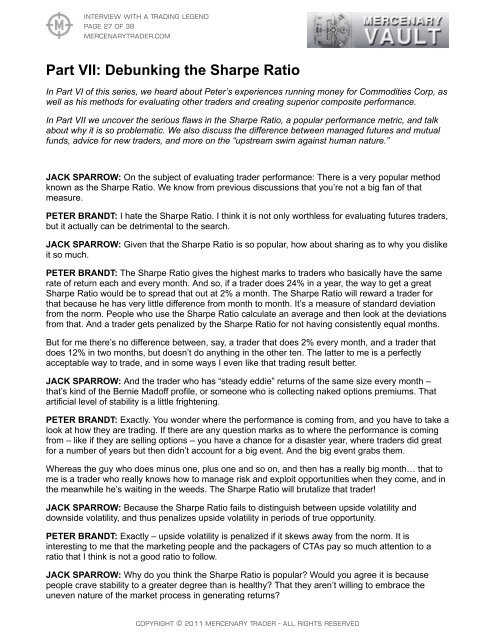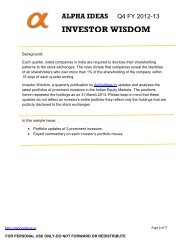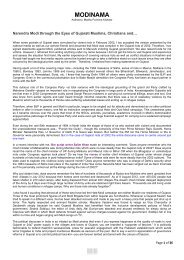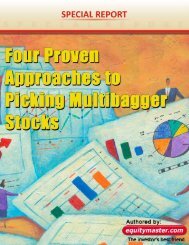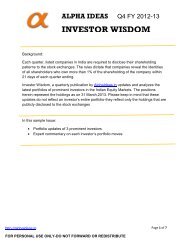Interview With a Trading Legend - Mercenary Trader
Interview With a Trading Legend - Mercenary Trader
Interview With a Trading Legend - Mercenary Trader
Create successful ePaper yourself
Turn your PDF publications into a flip-book with our unique Google optimized e-Paper software.
<strong>Interview</strong> <strong>With</strong> a <strong>Trading</strong> <strong>Legend</strong><br />
Page 27 of 38<br />
mercenarytrader.com<br />
Part VII: Debunking the Sharpe Ratio<br />
In Part VI of this series, we heard about Peter’s experiences running money for Commodities Corp, as<br />
well as his methods for evaluating other traders and creating superior composite performance.<br />
In Part VII we uncover the serious flaws in the Sharpe Ratio, a popular performance metric, and talk<br />
about why it is so problematic. We also discuss the difference between managed futures and mutual<br />
funds, advice for new traders, and more on the “upstream swim against human nature.”<br />
JACK SPARROW: On the subject of evaluating trader performance: There is a very popular method<br />
known as the Sharpe Ratio. We know from previous discussions that you’re not a big fan of that<br />
measure.<br />
PETER BRANDT: I hate the Sharpe Ratio. I think it is not only worthless for evaluating futures traders,<br />
but it actually can be detrimental to the search.<br />
JACK SPARROW: Given that the Sharpe Ratio is so popular, how about sharing as to why you dislike<br />
it so much.<br />
PETER BRANDT: The Sharpe Ratio gives the highest marks to traders who basically have the same<br />
rate of return each and every month. And so, if a trader does 24% in a year, the way to get a great<br />
Sharpe Ratio would be to spread that out at 2% a month. The Sharpe Ratio will reward a trader for<br />
that because he has very little difference from month to month. It’s a measure of standard deviation<br />
from the norm. People who use the Sharpe Ratio calculate an average and then look at the deviations<br />
from that. And a trader gets penalized by the Sharpe Ratio for not having consistently equal months.<br />
But for me there’s no difference between, say, a trader that does 2% every month, and a trader that<br />
does 12% in two months, but doesn’t do anything in the other ten. The latter to me is a perfectly<br />
acceptable way to trade, and in some ways I even like that trading result better.<br />
JACK SPARROW: And the trader who has “steady eddie” returns of the same size every month –<br />
that’s kind of the Bernie Madoff profile, or someone who is collecting naked options premiums. That<br />
artificial level of stability is a little frightening.<br />
PETER BRANDT: Exactly. You wonder where the performance is coming from, and you have to take a<br />
look at how they are trading. If there are any question marks as to where the performance is coming<br />
from – like if they are selling options – you have a chance for a disaster year, where traders did great<br />
for a number of years but then didn’t account for a big event. And the big event grabs them.<br />
Whereas the guy who does minus one, plus one and so on, and then has a really big month… that to<br />
me is a trader who really knows how to manage risk and exploit opportunities when they come, and in<br />
the meanwhile he’s waiting in the weeds. The Sharpe Ratio will brutalize that trader!<br />
JACK SPARROW: Because the Sharpe Ratio fails to distinguish between upside volatility and<br />
downside volatility, and thus penalizes upside volatility in periods of true opportunity.<br />
PETER BRANDT: Exactly – upside volatility is penalized if it skews away from the norm. It is<br />
interesting to me that the marketing people and the packagers of CTAs pay so much attention to a<br />
ratio that I think is not a good ratio to follow.<br />
JACK SPARROW: Why do you think the Sharpe Ratio is popular? Would you agree it is because<br />
people crave stability to a greater degree than is healthy? That they aren’t willing to embrace the<br />
uneven nature of the market process in generating returns?<br />
Copyright © 2011 <strong>Mercenary</strong> <strong>Trader</strong> - All Rights Reserved


